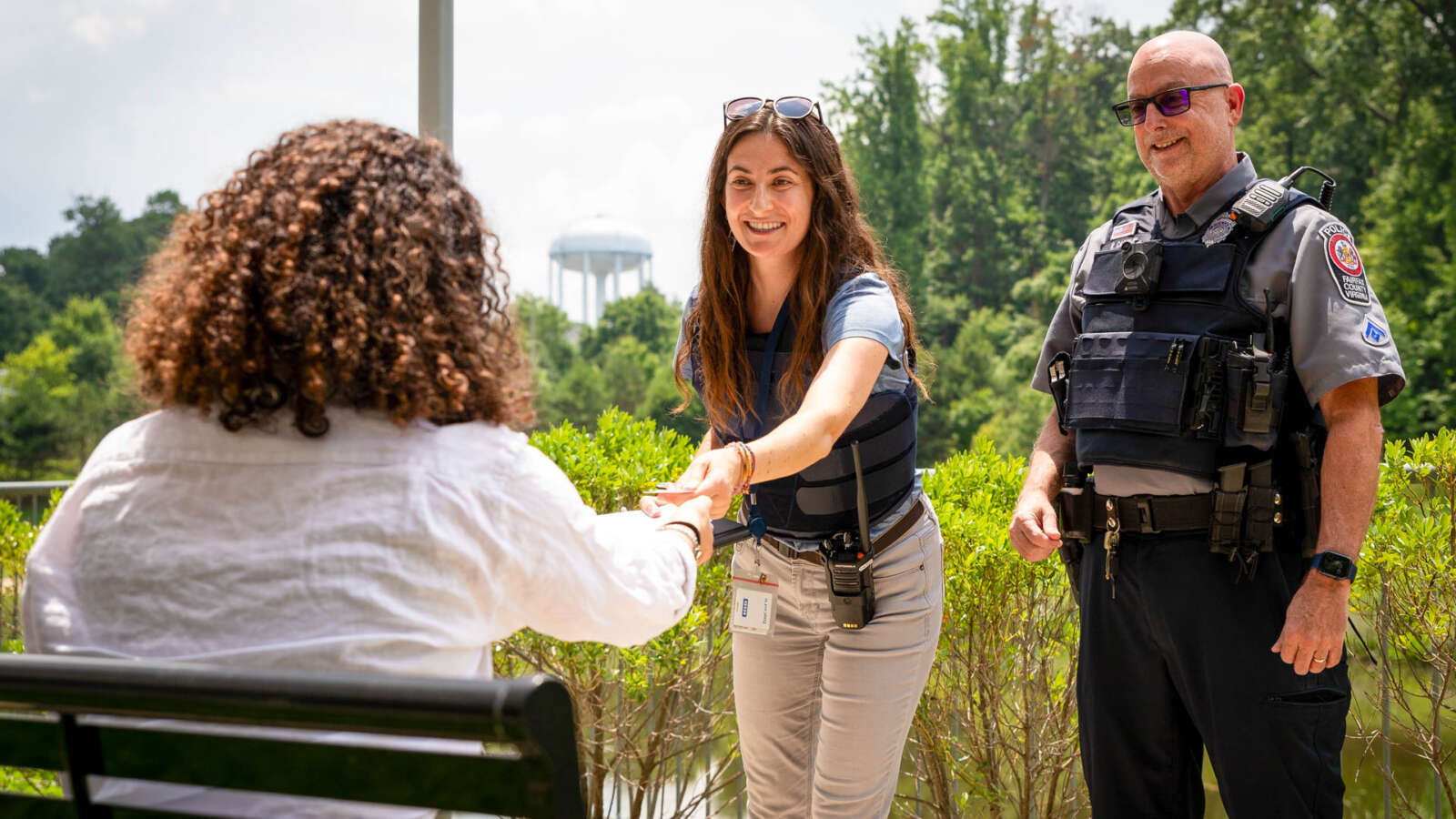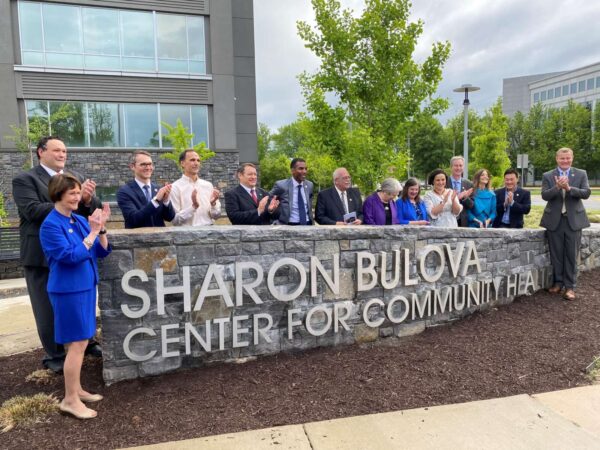
Fairfax County will bolster its capabilities to respond to and resolve emergency calls related to mental health this fall.
The Fairfax County Police Department and the Fairfax-Falls Church Community Services Board presented plans to roll out a fourth co-responder team and a telehealth pilot program at a Board of Supervisors safety and security committee meeting on Tuesday (Aug. 1).
Active since its pilot in March 2021 and made permanent in 2022, the co-responder program pairs a Crisis Intervention Team-trained law enforcement officer with a CSB crisis intervention specialist to respond to behavioral health calls. The duo rides together in the same patrol cruiser and either self-dispatch proactively to behavioral health calls or are dispatched by emergency services, FCPD Lieutenant Joanna Culkin explained during the meeting.
Co-responder teams aim to de-escalate situations involving an individual with a mental health crisis without use of force, incarceration or hospitalization to decrease instances of individuals being harmed by law enforcement.
Currently, three co-responder teams operate in the county, according to CSB Division Director of Emergency and Crisis Care Services Laura Maddock.
Two of the teams are active from noon to midnight seven days a week. The third team currently works from 2 p.m. to 11 p.m. three days a week but will expand its coverage to match the other two teams on Aug. 15.
The fourth co-responder team that Maddock expects to join in late September or early October will follow a similar trajectory, starting with three-day coverage before transitioning to operating for a full week.
The continuing expansion of these mental health crisis services comes after the program showed measurable success in a June 30 data pull, Culkin says. She noted that the co-responder program has successfully increased timely on-scene assessment, with the presence of a clinician often de-escalating situations.
“Sometimes just having the clinician show up paired with our law enforcement counterpart puts people at ease and lets them know that, really, behavioral health is the main focus of our response,” Culkin said.
Culkin cited increased linkages to behavioral health services and higher levels of care, decreased rates of incarceration and arrest, and decreased visits to emergency services as benefits of the program. She said the program helps address “the [psychiatric] bed capacity issue across the state of Virginia” by resolving many cases in the field so fewer individuals need further care.
Of the 1,300 calls that got a co-responder response since the program began, 50% were resolved in the field, 30% were diverted from arrest or hospitalization, 26% resulted in higher level of care and 17% resulted in an Emergency Custody Order and/or Temporary Detention Order, Culkin said.
“That 17% is a really good number for us,” Culkin said. “When we’re looking at if a regular patrol officer had responded…without the ability to do those timely on scene assessments or come up with a safety or care plan, we’re looking at a significantly higher number of ECOs and TDOS.”
To further illustrate the co-responder program’s impact, Culkin recounted an instance where a clinician successfully worked with officers to “talk down” a “distraught subject” who was standing atop a ledge on a parking garage in Dunn Loring and “get him the help he needed.”
On another occasion, a co-responder team responded to a behavioral health call from a man “in emotional distress who indicated that nobody had ever celebrated his birthday.” After helping the man, the pair came back the next day with a birthday cake and enjoyed a belated celebration with him.
“These are good examples of both of the ways the co-responder program has had a positive impact with our community,” Culkin said.
The FCPD and CSB will additionally pilot a new telehealth program following the same fall timeline as the fourth co-responder team. Two police stations in Reston and McLean will receive iPads that officers can use to remotely contact a trained clinician at the Merrifield Crisis Response Center around the clock to fill gaps in coverage, since the co-responder teams don’t operate 24/7.
Maddock hinted that the county is working on implementing a follow-up team, which would consist of a peer and clinician going out to subjects of co-responder cases for check ins and referrals.
FCPD is also striving to increase the number of police officers who have undergone CIT training from 40% to 42% by the end of the year, Culkin said. The number has been slowly increasing over the last couple of years after less than a third of officers had received CIT training in 2021.

Fairfax County’s Merrifield Center has a new, slightly more descriptive name.
The Sharon Bulova Center for Community Health was officially christened at a dedication ceremony yesterday (Thursday), taking its name from the former Board of Supervisors chairman who helped develop the Diversion First initiative aimed at shifting people with mental health and substance use challenges to treatment instead of incarceration.
“Sharon is more than a mentor, she is a friend, and her legacy to Fairfax County is unmatched,” said current Board of Supervisors Chairman Jeff McKay, Bulova’s successor. “It is entirely fitting that this center, which is at the heart of our Diversion First initiative, is named in her honor.”
Located at 8221 Willow Oaks Corporate Drive, the facility opened in March 2015 to serve as a central hub for the Fairfax-Falls Church Community Services Board, which provides emergency services and other supports for people who have mental illnesses, substance use disorders, and developmental disabilities.
As the board chairman from 2010 to 2020, Bulova oversaw Diversion First’s launch in 2016 as an effort to rethink the county’s approach to mental health after a police officer shot and killed Springfield resident John Geer in 2013 and sheriff’s deputies restrained and stunned Natasha McKenna, resulting in her death in 2015.
“It was their tragic deaths that sparked change,” Bulova said, acknowledging that it was a “pretty tense” time in the county. “Both incidents shown a stark light on the county’s need for reforms and policies regarding transparency, oversight, use of force, and criminal incident response, including and especially in cases involving persons suffering from mental illnesses.”
Focused on people involved in the criminal justice system for non-violent offenses, the initiative started primarily as a partnership between the CSB, police, and sheriff’s office. It has since expanded to include housing assistance and specialty veteran, mental health, and drug court dockets to address the specific needs of those populations.
Per a news release from McKay’s office:
Diversion First is designed to prevent repeat encounters with the criminal justice system, improve public safety, promote a healthier community and is a more cost effective and efficient use of public funding.
Since its founding in 2016, there have been more than 12,000 law enforcement transports to the now-Bulova Center where the Diversion First program is located. Over 8,600 people were under an emergency custody order and 3,540 additional transports were because an officer recognized that an individual in the community needed behavioral health services. Over 2,600 have been diverted from potential arrest. Of those transported to the MCRC by law enforcement, on average 80% do not have a repeat visit to the MCRC related to criminal justice involvement within a year. Over 80% of those diverted from potential arrest in 2019 were not incarcerated during the following year.
“Diversion First is a revolutionary concept that was and remains ahead of its time,” McKay said. “This remarkable facility and its community impact on a daily basis are a testament to the type of change that forward-thinking, innovative local government involvement can make.”

County Board to Adopt New Budget Today — “Board of Supervisors set to adopt FY23 budget tomorrow, May 10. It fully funds @fcpsnews employee compensation and invests in priorities. $96 million balance to reduce real estate tax rate, increase affordable housing, parks, among others.” [Fairfax County Government/Twitter]
Lee District Gets New Community Center — Elected officials and community members gathered on Saturday (May 7) to cut the ribbon for Fairfax County’s new Lee District Community Center, which will provide recreation, educational workshops, and other programs to residents in the Buckman Road area on the west side of Richmond Highway. The center also hosts a workforce training and development center. [Neighborhood and Community Services]
Metro Reports Higher-than-Expected Ridership — “Ridership has already surprised their conservatively-estimated projection of 28 million rides by nearly 40% through the first three quarters of the fiscal year…The numbers bode well for the region’s economic recovery as tourism rebounds and more workers return to the office, but it is less welcome news for train and bus riders who are experiencing more crowded vehicles.” [DCist]
Great Falls Road Closure Starts Today — “Springvale Road will be closed for 48 hours starting Tuesday to allow VDOT crews to reconstruct the road’s approach to Route 7. During the closure, drivers on Springfield Road can access Route 7 by taking Georgetown Pike to the Utterback Store Road.” [Patch]
Mental Health Services Facility to Be Renamed — “Fairfax County officials on May 12 will celebrate the renaming and dedication of the former Merrifield Center as the ‘Sharon Bulova Center for Community Health’…Bulova served as chairman through 2019, when she retired after 31 years on the board.” [Sun Gazette]
Route 7 Bus Service Plan Inches Forward — “Plans to create a bus-rapid-transit, or BRT, line using Route 7 to connect Tysons to Alexandria continue to move forward, with the next installment to hire a consultant that will guide the next phases of the project.” [Sun Gazette/Inside NoVA]
Fort Hunt Teacher Reflects on Three-Decade-Long Career — “Reading Specialist Jill Norris joined the staff of Stratford Landing Elementary School in Fairfax County last August after a break from a 35-year career as a teacher. ‘To share my passion for reading and writing with kids and teachers,’ is what brings joy to Norris.” [ABC7]
It’s Tuesday — Clear throughout the day. High of 66 and low of 46. Sunrise at 6:02 am and sunset at 8:11 pm. [Weather.gov]

